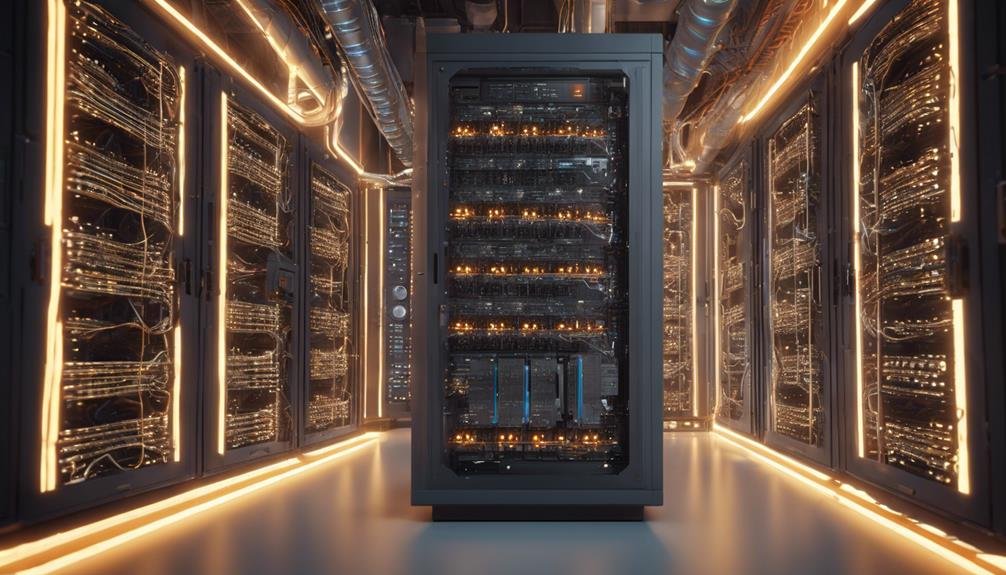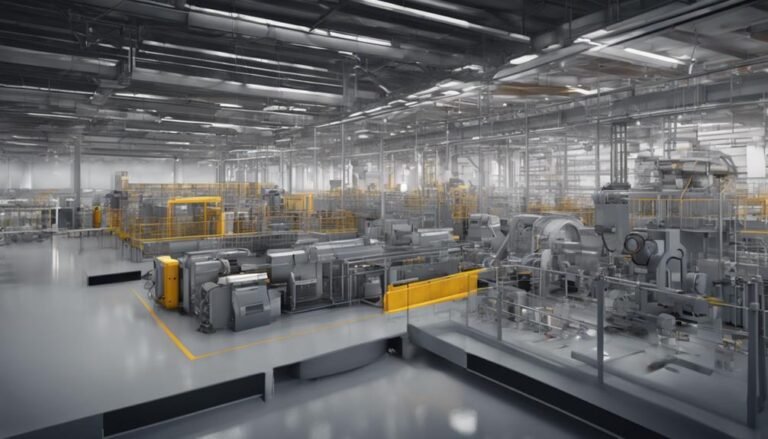What Is Bitcoin Mining?
Bitcoin mining involves revealing transactions by solving complex mathematical puzzles using specialized computer hardware. Miners compete to find a nonce that generates a hash using the SHA-256 algorithm. Rewards include bitcoins and transaction fees distributed through block rewards. Challenges include energy consumption and operational costs, driving the need for powerful computational resources. Future innovations focus on green mining solutions, AI-driven algorithms, and modular hardware to increase efficiency. The evolution, mechanics, rewards system, challenges, and innovations in Bitcoin mining shape the cryptocurrency landscape profoundly. Digging deeper into this process exposes a complex ecosystem with vast technological and financial implications.
Key Takeaways
- Bitcoin mining is the process of validating transactions and adding them to the blockchain.
- Miners compete to solve complex mathematical puzzles using specialized hardware.
- Successful miners are rewarded with newly minted bitcoins and transaction fees.
- The process requires significant computational power and energy consumption.
- Mining plays a crucial role in securing the Bitcoin network and maintaining its decentralized nature.
History and Evolution of Bitcoin Mining
The evolution of Bitcoin mining can be traced from its humble beginnings with desktop CPUs to the current dominance of ASIC miners in the competitive landscape of cryptocurrency mining. Technological advancements have played a pivotal role in shaping the mining industry, moving from basic processors to specialized hardware designed specifically for mining operations, greatly increasing efficiency and speed.
This shift has not only revolutionized the mining process but has also led to regulatory implications as governments worldwide grapple with the implications of this rapidly evolving sector. The introduction of ASIC miners has raised concerns about centralization and regulatory oversight, prompting discussions on how to guarantee a fair and decentralized mining ecosystem while addressing potential risks associated with concentrated mining power.
Mechanics of Bitcoin Mining
How does the intricate process of Bitcoin mining unfold to secure the blockchain and reward miners for their computational efforts?
Bitcoin mining involves solving complex mathematical puzzles using a mining algorithm, typically SHA-256. Miners compete to find a nonce that, when combined with block data, generates a hash below a target threshold.
This process requires specialized hardware, evolving from CPUs to GPUs and now ASIC miners due to increasing mining difficulty. ASIC miners offer high computational power, essential for competitive mining.
The hardware requirements include powerful processors, high RAM capacity, and efficient cooling systems to handle the energy-intensive calculations.
Successful miners are rewarded with newly minted bitcoins and transaction fees, incentivizing their participation in maintaining the network's integrity.
Bitcoin Mining Rewards System
Utilizing a structured incentivization mechanism, Bitcoin mining rewards participants with newly minted bitcoins and transaction fees for their computational contributions to the network's security and integrity. Key incentive mechanisms play an important role in motivating miners to dedicate their resources to validating transactions and securing the blockchain.
The reward distribution involves a combination of block rewards and transaction fees, with the former halving periodically to limit the total supply of bitcoins to 21 million. Miners are incentivized to compete for these rewards, especially during halving events, by including transactions in blocks and efficiently solving cryptographic puzzles.
Mining pools further enhance reward distribution by allowing miners to collaborate and share rewards based on the work contributed, ensuring a more consistent income stream for participants.
Challenges in Bitcoin Mining
Despite the profitability and structured incentivization mechanisms in Bitcoin mining, the process faces significant challenges that impact its efficiency and sustainability in the cryptocurrency ecosystem.
One of the key challenges is the substantial energy consumption associated with mining activities. The energy-intensive process not only leads to high operational costs but also raises concerns about the environmental impact of Bitcoin mining.
The continuous need for powerful computational resources to compete in mining exacerbates these challenges, as more energy is consumed to maintain competitiveness. As the industry grows, addressing these challenges becomes vital to guarantee the long-term viability of Bitcoin mining while mitigating its environmental footprint.
Balancing profitability with energy efficiency and sustainability remains an urgent issue for the cryptocurrency mining sector.
Future Innovations in Bitcoin Mining
In exploring the evolution of Bitcoin mining, a pivotal focus lies on the emergence of innovative technologies and methodologies poised to revolutionize the efficiency and sustainability of the mining process. Sustainable technology and efficiency improvements are at the forefront of future innovations in Bitcoin mining. These advancements aim to address the energy-intensive nature of mining while enhancing the overall performance and environmental impact of the process.
| Future Innovations | Description | Benefits |
|---|---|---|
| Green Mining Solutions | Implementing renewable energy sources for mining operations. | Reduced carbon footprint, lower operating costs. |
| AI-Driven Mining Algorithms | Using artificial intelligence to optimize mining processes. | Increased mining efficiency, enhanced problem-solving capabilities. |
| Modular Mining Hardware | Developing modular and upgradable mining hardware. | Flexibility, scalability, and cost-effectiveness in mining operations. |
Conclusion
To sum up, the intricate process of Bitcoin mining serves as the backbone of the cryptocurrency network, ensuring transaction security and integrity.
Despite facing challenges such as energy consumption and scalability issues, ongoing innovations and discussions are shaping the future of mining operations.
Just as miners diligently excavate for precious minerals, Bitcoin miners tirelessly work to uncover digital rewards, solidifying the foundation of the decentralized blockchain ecosystem.







